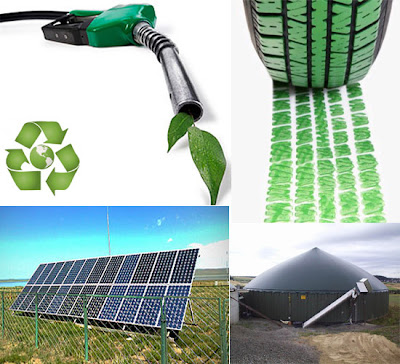Eco-Friendly Energy Sources: A Solution To Problems Of Tomorrow
Pollution, rising fuel prices, heavy consumption of machinery and equipment: all seem to be a part of the same underlying crisis which is eminent in the world today; the energy crisis. With nature taking a beating with the carbon emissions, fuel supply chains getting pushed and pulled in different ways, there is very little ways in which one can overlook the widespread concern about the avenues for alternative fuel whose demand is on the rise. There hopefully, have been a few solutions, and has caught the attention of many but needs more concentrated effort never the less. This is all about a few of these alternative eco-friendly fuels which could end up meeting our demands for energy:
1) Bio diesel
Bio diesel is, in simple terms, an eco-friendly fuel created by reacting any animal or vegetable fat (oils), with an alcohol which can produce fatty acid easters. The resultant fluid not only emits much lesser carbon and other toxic gases, but also plays in maintaining the engine or combustion chamber for the long run. Common petro-diesel options have large amount of solid residue, which harms engine a lot, thus increasing maintenance cost. Based on fixed measurements, if bio-diesel gets mixed with petro diesel, it increases the lubrication of the parts of the engine based on it, thus making functioning more efficient and combustion more complete. The partial combustion which happens in conventional fuel, ends up leaving too much carbon waste behind, which bio diesel helps reduce to a large extent.
The initial thought which comes to one's mind when thinking about bio diesel is, the modifications which one has to undertake for one's vehicle or machine, in order for it to run on this fuel. The solution for that can be, creating a perfect 'B' factor in it. This means, that bio-diesel can be mixed with petro-diesel, to create such a mixture that both fuels end up giving out there full benefits, without machine parts having to be replaced completely. Variants of this fuel available include B100 (100% pure bio-diesel), B20 (20% bio diesel), B5 (5% bio diesel), and B2 (2% bio diesel), but mixtures as per need and safety measures can be prepared. Though the ultimate aim for everyone would be convert to bio-diesel completely, but using the eco-friendly fuel in minor quantities will definitely help reduce emissions, and bring up the fuel and energy use efficiency.
Some common uses: private vehicular fuel, public transport vehicles' fuel, aircraft fuel, heating oil.
Some advantages of bio-diesel: lower pollution levels and carbon emissions, lesser maintenance for engines running on fuel due to lower residue and higher efficiency, lower production cost even after being produced at a private residential scale, higher rate of investment returns in long run.
Some roadblocks of bio-diesel: water contamination due to the reactions which occur as a result of its emissions, freezing and clouding of the fuel depending upon the source, and also the logistic and distribution of the fuel.
2) Solar Power
The sun has been the source of energy for virtually all life on earth, and whatever may have existed in other planets. It should not be a wonder that whatever we receive here on earth, cant be converted into electrical energy or fuel to meet our energy needs and that too, completely non-polluting and virtually inexhaustible in it's ways. Hence, the whole process of converting solar energy to electricity or using it for other daily chores, is what solar power is all about. From cooking to generating electricity, to driving yachts and cars, the scenario has changed a lot in the recent past, and the movement seems to be gaining momentum as well.
The most common method used to garner the solar energy for energy requirements, is through solar cells, or solar panels which are panels of multiple solar cells fixed on a common base. The basic function that these units perform, is to convert the sunlight into electricity for later retrieval and usage. The process is called photo-voltaic reaction, where by the solar panel constituents convert the solar radiation into electricity, via a chemical reaction which occurs due to sunlight falling on them. It so happens that when sunlight falls on these panels, free electrons are generated within the cell which then trapped in by diodes, to direct the energy generated towards the channels where they are needed. Most of the times, they r either readily used, or meant to charge storage batteries which are used when one source of power isn't functional or there lies a power shortage.
Some common uses of solar energy: private and public place electricity generation, especially lighting, back-up power generators, vehicular power source including some private yachts, and cooking.
Some advantages of solar power: completely pollution free, abundant supply, can also be stored and used later through special solar generators, relatively low maintenance and cheap to produce in the long run.
Some of the roadblocks of solar energy: Most of the pitfalls associated with this energy source is temporary and can be solved with efficiency issues. They are energy conversion ratio or solar insulation, could be a hindrance where large panels cannot be installed especially those with limited areas, and also the high initial cost of purchase and installation.
3) Biogas
Never thought that plant, animal, or human waste can be used to convert into something productive, and more so, a rather useful and Eco-friendly source of energy. Technically speaking, Biogas is all about plant and animal waste breaking down in the absence of oxygen, to form biogas and solid manure residue. While the gas in perfectly eco-friendly leaving behind very little or no carbon residue, the solid residue left behind in the tank where it all happens, could be used as a huge supplement for nourishing the soil as manure. Housed within a sewage tank, where all the waste from plant, animal, and human waste collect, the process of anaerobic fermentation (fermentation without oxygen) takes place, where the whole waste content breaks down into biogas, and solid residual matter. The gas itself would comprise of components like methane, carbon dioxide, nitrogen, hydrogen sulfide, and traces of oxygen.
The vast areas like the rural regions of India, which surpasses most European nations in terms of size, could completely change and farm produce would increase multi-fold if properly implemented. Rural Germany has already started using it to supplement their energy demands, and countries like UK are already thinking of it as another eco-friendly source of vehicular fuel.
Some common uses of biogas and its supplement: Household cooking fuel, electricity generation, vehicular fuel, soil nourishing manure.
Some advantages of biogas: eco-friendly energy source with little or no carbon emissions, large source of natural manure for farming and vegetation, lesser cost to maintain equipment in the long run, elimination of various sources of pollution in the environment especially those arising from exposed waste matter.
Some roadblocks of biogas: initial high expense for setting up infrastructure, lack of proper information regarding the uses and production of biogas, could be a highly explosive fuel if equipment and infrastructure isn't laid out properly especially pipes.
The fuel sources with regards to alternative energy are much more than what is listed here, and also rather extensive in their technical detailing. The aim of writing this post is to just draw attention to the subject, even though limited it may be, so that some audience knows that there are subjects which need greater attention in the times to come.
Via: Midwest Green Fuel/ Biodiesel Madeez/ Big Solar Panels/ Sulabh International/ Bio Gas/ Clintern Solar/ Tiaca/ Propbiofuels/ goldstockbull











Comments